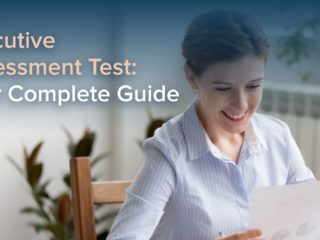|
Getting your Trinity Audio player ready...
|
The Executive Assessment (EA) is an important part of your application for your EMBA or other advanced programs. You’re choosing to continue your education at a time when there are many demands on your time and energy. Thus, choosing your test date is a critical strategic decision that should not be taken lightly.
You already know the value and the necessity of having a solid study plan for your EA prep. Without one, you’ll struggle to study effectively, and you’ll find that you’ve wasted precious time and energy. In a similar vein, you need to know when to schedule your exam to have the best outcome. It’s important to create a plan so that you’ll take your exam when it is optimal to do so.
So, in this article, we’ll discuss 5 key considerations for scheduling your Executive Assessment.
Here are the topics we’ll cover:
- Signing Up for the Executive Assessment
- Consideration #1: Your Deadlines
- Consideration #2: Your Score Goal
- Consideration #3: Your Baseline Score
- Consideration #4: Your EA Timeline
- Consideration #5: Retakes
- Key Takeaways
- Frequently Asked Questions (FAQ)
- What’s Next?
Let’s first take a look at the process of signing up for the EA.
Signing Up for the Executive Assessment
You may be wondering, when should I take the Executive Assessment? Well, here is the good news: Executive Assessment test dates are available any time of year. Additionally, you have two choices of testing modality: at a test center or online. Since seats can fill up at a test center, you’ll want to plan ahead if you plan to take the exam in person. Conversely, if you plan to take the EA online, then you do not have to schedule your Executive Assessment online appointment so far in advance.
KEY FACT:
The Executive Assessment is offered year-round.
Signing up for the EA is a pretty simple process. To register for your exam, you can head to mba.com and complete the following steps for creating an Executive Assessment account and scheduling a test date.
- Set up an account by filling in some basic personal information.
- Determine the schools to which you’d like to send your EA scores (on test day) or choose not to send your scores to any schools (on test day).
- Schedule your Executive Assessment for either in-person or online testing.
- Pay for your Executive Assessment.
Now that you are clear on how to sign up for the EA, let’s discuss some considerations related to deciding your test date.
Consideration #1: Your Deadlines
As you may know, students applying to business schools take the Executive Assessment. Originally, only students applying to Executive MBA programs took the exam, but now students applying to full-time and part-time programs can also take the EA. After you determine that your desired programs do, in fact, accept the EA, you will want to research your programs’ application deadlines before deciding the date and time for your EA.
For example, the EMBA program at Wharton has deadlines of mid-October and mid-January, whereas Yale’s EMBA program has deadlines in November, January, and March. Many schools have no set deadlines, accepting scores continuously for upcoming program start dates. Remember that deadlines can change, so always research specific deadlines for programs that interest you.
Once you know your application deadlines, you can plan your EA preparation timeline appropriately, so that you will have completed your EA prep well before your deadlines.
Also, don’t forget that completing your applications will take some time. So, in an ideal situation, you’ll get your EA wrapped up, and then you can start working on your applications. Trying to do both simultaneously is quite difficult!
TTP PRO TIP:
Before beginning your EA preparation, determine your application deadlines.
Next, let’s discuss your score goal.
Consideration #2: Your Score Goal
A common question I get from new EA students is, “What is a good EA score?” Those who are not familiar with the EA expect me to give a specific score goal for their desired program, complete with score percentiles, acceptance data, and other information. However, this is not the information I provide to them!
Recall that the Executive Assessment is a “readiness assessment.” In other words, it is an indicator of your ability to handle graduate-level academic work. It does not function like the GMAT, for which students are motivated to score the highest score possible. For the EA, as long as you score at or above a school’s “threshold level,” you will have indicated an ability to handle the program’s academic rigor.
What EA Scores Do Programs Want to See?
Most EMBA programs do not publish EA score range data, nor do they break out accepted students’ scores by median or mean score. Even top schools simply state that an EA score of 150, or occasionally 155, fulfills the “readiness” requirement. They then consider the rest of an applicant’s package, including work experience and letters of recommendation, to make the final determination about a candidate’s admission.
Do note that most programs want to see a balanced score across IR, verbal, and quant. You may recall that the EA score starts at 120 and adds the raw scores from each of the three sections. Thus, a student with a raw score of 10 on each EA section will have an EA score of 120 + 10 + 10 + 10 = 150, which is the threshold score for nearly all programs.
The threshold EA score of 150 is at about the 50th percentile. However, don’t assume that studying for the EA will be a walk in the park! The EA tests everything that the GMAT does (with the exception of geometry), so you will still need to be competent in a huge number of topics. Add to this the fact that you have probably been out of school for a greater number of years than the average GMAT student, so you may be somewhat rusty on some topics. You’ll definitely need to spend significant time studying.
TTP PRO TIP:
Understand the scoring information at your desired schools before you begin your EA prep.
Consideration #3: Your Baseline Score
Once you have your target score in mind, your next step is to take an official EA practice exam. Many students skip this crucial step because they are concerned that if they get a low score, they’ll lose their motivation and give up even before they start. However, you always need to remember that this score represents your starting point and nothing else!
So, even if your Executive Assessment results on the practice test are lower than you’d like, you’ll be able to better plan your study strategy if you know where you’re starting from. Think about it: If you don’t know your starting point, there is no way to know how long it will take to reach the finish line, right? So, give yourself 90 minutes to knock out a practice exam!
Also, you do not have to prepare too much before taking the practice exam. Spend a day or two familiarizing yourself with the format and structure of the EA. Then answer a few practice questions of the various types. After that, you’ll be ready to take the practice test.
TTP PRO TIP:
Do some light studying, and then take the first EA practice exam.
How to Take Your First EA Practice Exam
I do not want to understate the importance of your initial baseline EA score. As I mentioned earlier, it will provide the necessary information to see how far you are from your target score. So, to get the most accurate score possible, follow test-day rules and procedures when taking your first practice test.
For example, there are no breaks during the EA, so don’t take any during your practice exam. If you are taking the in-person exam, use the same dry-erase notebook and marker you’ll be provided with at the test center. If you are taking the EA online, use the same whiteboard and marker you’ll use on test day. These are just a few rules, but you get the point!
TTP PRO TIP:
Make the experience of taking your first EA practice exam as realistic as possible.
Once you have your EA baseline score and target score, you can begin your study plan.
Consideration #4: Your EA Timeline
While many students like to know how long they may have to study for the EA before gathering any data, your timeline will mostly depend on how far you are from your target score. For example, if you are 5 points from your target, you can complete your EA prep faster than you would be able to if you were 15 points from your target.
Additionally, your EA prep timeline is dependent on your weekly study hours. If you can put in 20 hours a week, you’ll complete your prep much faster than you will if you can put in 10 hours. Or consider your lifestyle. If you have a full-time job, you probably cannot dedicate as many study hours as someone who does not work full-time.
At the end of the day, understand that your EA timeline and study plan are unique. Sure, you can follow the advice of past EA test-takers. However, other EA test-takers are not in your exact situation.
So, your timeline comes from your baseline score, target score, and your weekly routine. As long as you are doing whatever you can to fit in EA prep, ideally, you’ll be able to take the EA sooner rather than later.
TTP PRO TIP:
When considering your EA timeline, be sure to factor in your baseline EA score, target score, and weekly study hours.
Consideration #5: Retakes
While scheduling your initial EA test date is important, you must also consider the possibility of retakes. So, when scheduling your first EA, select an initial test date that leaves room for one, or even two, retakes.
The nice thing about the EA is that you can retake the exam as soon as 48 hours after your previous test. So, if you have a bad day and want to retake the EA almost immediately, you can!
All that said, you must consider admissions policies when planning for any EA retakes. Let’s discuss those policies now.
TTP PRO TIP:
When scheduling your first EA test date, try to leave a cushion for a retake.
How Admissions Policies Can Affect Your Ability to Retake
When considering a retake, you need to know whether the admissions committee requires an official score or unofficial score by the due date of your application. Once you know the policy, you also must remember that it takes around 7 business days for schools to receive your official EA score. So, let’s look at how all this could play out for you.
Say you have a deadline of January 15 and take your EA on January 5. Your official score will be received no more than 7 business days later (i.e., 9 calendar days), which is January 14. But what happens if you don’t hit your score goal? You can take another EA just 48 hours later, on January 7, but note that 9 calendar days after January 7 takes you past the application deadline. Thus, if admissions requires an official score, you will have missed your deadline, and scoring at your target on the retake will be of no use. However, if admissions is willing to accept your unofficial score, your retake score from January 7 will make it in time to meet the deadline.
TTP PRO TIP:
Understand the policies of admissions before scheduling your EA.
While these considerations are important, ideally, you’ll knock out your EA months before your applications are due. Let’s discuss that now.
Knock Out Your EA Prep Months Before Your Apps Are Due
We have discussed test-date considerations revolving around application deadlines and admissions policies. However, knocking out your EA months before your applications are due is the safest move! There is no sense in waiting until weeks before your applications are due to take your EA, right? Not only is simultaneously working on applications and EA prep challenging, but also crossing your fingers that your official score arrives on time is a chance you don’t want to take. What if you are sick on the day of your EA and can’t take it? What if there is a technical issue with your exam? Or a blizzard? You get my drift.
So, try to plan months — or even years — ahead. For example, if you know that you’ll apply to an EMBA program within a few years, get the EA off your plate now. Trust me, your future self will thank you!
TTP PRO TIP:
If possible, wrap up your EA well in advance of your application deadlines.
Key Takeaways
There are many factors to consider before you schedule the date of your Executive Assessment:
- Check with your desired programs to determine whether there are application deadlines that you must meet.
- Know your target score. While most schools consider 150 as their threshold score, some programs might specify a score as high as 155+.
- Take a practice test to establish your baseline score.
- Plan your EA study schedule based on your target score, your baseline score, and the number of hours you can commit to studying each week.
- Build in time to retake your exam if necessary, such that your retake score can reach your desired schools prior to application deadlines.
Frequently Asked Questions (FAQ)
How Do I Schedule the Executive Assessment Test?
After you create your account at mba.com, you can easily sign up for the EA at your convenience.
When Can You Take the Executive Assessment?
You can take the EA year-round, at either a test center or online.
How Often Can I Take the Executive Assessment?
There is a 4-test lifetime limit, including 2 tests taken at a testing center and 2 tests taken online.
How Long is the Executive Assessment Valid?
Your EA score is valid for 5 years.
What’s Next?
Finding the perfect work-study balance can be very challenging for working professionals. Read this article to craft some strategies for preparing for the Executive Assessment when you are working full-time.



